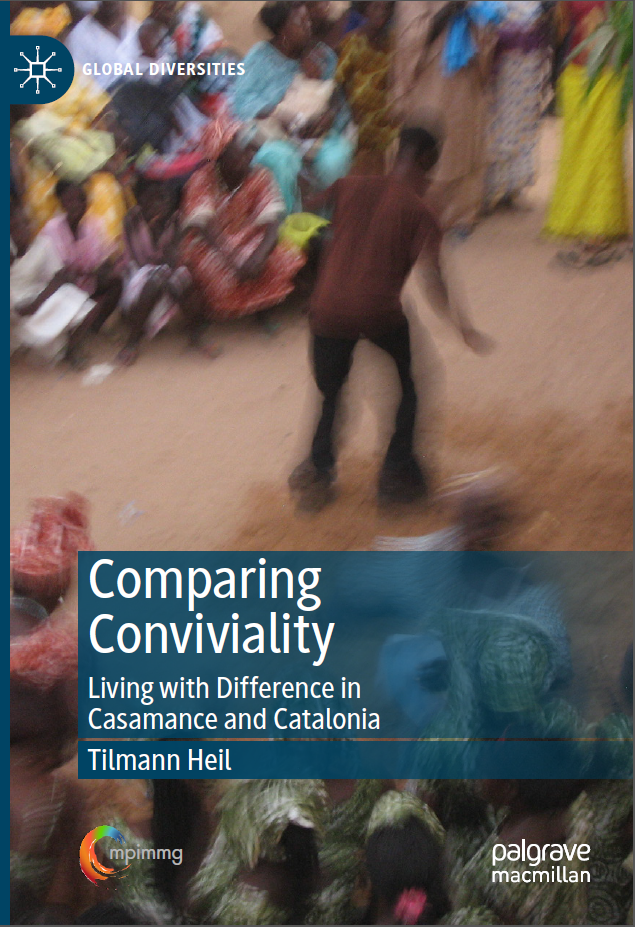|
As a key part of my research for the book Comparing Conviviality, I reflect on the differences between me and my interlocutors, my privilege and the commonalities we identified and challenges we faced. The relations we forged throughout the research process and beyond materialized at the intersection of race, origin, class, world view and outlook, among others.
Impressions from the presentation and debate of Comparing Conviviality at the Núcleo Interdisciplinar de Estudos Migratórios (NIEM), IPPUR, Universidade Federal do Rio de Janeiro, in March 2020.
The sound at the beginning and end are from ZigFest in 2010 in Ziguinchor, Senegal which I discuss in Chapter 4: Staged and sensous. If ever you do not have access to the book through your institution, please get in touch.
The book Comparing Conviviality takes the claim to a better knowledge and practice of how to live with difference foreward that Senegalese migrants in Catalonia made. Pursuing such non-hegemonic knowledge during 18-month of multi-sited, ethnographic fieldwork in Casamance, Senegal, and Catalonia, Spain, this quest has led to the formulation of an unstable concept: conviviality.
Impressions from the presentation and debate of Comparing Conviviality at the Núcleo Interdisciplinar de Estudos Migratórios (NIEM), IPPUR, Universidade Federal do Rio de Janeiro, in March 2020.
The sound at the beginning and end are from ZigFest in 2010 in Ziguinchor, Senegal which I discuss in Chapter 4: Staged and sensous. If ever you do not have access to the book through your institution, please get in touch.
My work on migration accross one of the most unequal geographies in the world, the Mediterranean, was driven by the dissatisfaction with how the people were mainly framed: victims, criminals, or undeserving 'bogus' refugees. These debates are often driven by the problem of Europeans to deal with those who are different at their doorstep. My book Comparing Conviviality shifts this debate, engaging with the knowledge of mobile Africans and how they live with difference.
Impressions from the presentation and debate of Comparing Conviviality at the Núcleo Interdisciplinar de Estudos Migratórios (NIEM), IPPUR, Universidade Federal do Rio de Janeiro, in March 2020.
The sound at the beginning and end are from ZigFest in 2010 in Ziguinchor, Senegal which I discuss in Chapter 4: Staged and sensous. If ever you do not have access to the book through your institution, please get in touch.
Núcleo Interdisciplinar de Estudos Migratórios, IPPUR, Universidade Federal do Rio de Janeiro
During the second discussion of my monograph Comparing Conviviality during the first meeting of the Interdisciplinary Group on Migration Studies at the Federal University of Rio de Janeiro, I conveyed a long story in a nutshell: how my thinking on conviviality is grounded in representations and practices of neigbhourliness and cohabitation that make it necessary and possible to arrive at a concept of living with difference that frames forms of minimal sociality in unstable, uncertain, and changing urban contexts. This contrasts to Stuart Hall's characterisation of most of our concepts, which social sciences came up with to give us the impression of a stability that in actual fact never existed. Conviviality instead is meant to be a simple tool to speak of such complex and challenging situations and describe how human sociality unfolds in them.
I thank my colleagues from the Research Group and other participants for their interest and appreciation, especially Prof. Miriam da Silveira Santos who kicked off her comments with: 'I have accompanied Tilmann's work for some years now; no I finally understood what he does. He goes back to a key dimension of anthropology: that of comparison.' It resonated with Prof. Joana Bahia observation how I pay attention the fact that our interlocutors in the field - in my case transnational Senegalese from the Casamance region - are the true masters of comparison.
in African Diaspora 11 (1-2): 53-70
Abstract Based on my time with im/mobile West Africans in Senegal and Spain since 2007, I propose conviviality to conceptualise the complexity of my interlocutors’ local and diasporic tactics and views of living with difference. Simple everyday encounters such as greeting and dwelling in urban spaces serve to disentangle their various levels of reflection, habitual expectations and tactical action. They had local to global reference frameworks at their disposal. Not pretending to represent their knowledge, I discuss the inspirations I received from trying to understand what they shared with me non/verbally regarding living with difference. To start from this decentred set of premises challenges established Western/Northern politics of living with difference. Through conviviality, I show a distinct way of engaging multiple and overlapping ways of differentiating and homogenising practices and raise awareness for the importance and feasibility of minimal socialities in diasporic configurations, transnational migrations and the respective local urban contexts. link
in Mecila Working Paper 14 (full text)
Abstract Current academic usages of the notion of conviviality often carry a normative connotation in which it is opposed to tension and conflict. Instead, I propose to use conviviality as an analytical term; This everyday living together is characterized by tensions, contradictions, and inconsistencies that complicate abstract theorization and the use of clearly defined concepts whose role is, as Stuart Hall once suggested, to give us a good night’s rest by feigning a stability we long for. If conviviality is, as I suggest, understood as a notion that embraces the inconsistencies, multiplicities, and complexities of new urban ways, I inquire into the emerging relationalities between recently-arrived Senegalese and their social context in Rio de Janeiro under the impact of multiple hierarchical orders, including race, origin, education, and class. |

 RSS Feed
RSS Feed